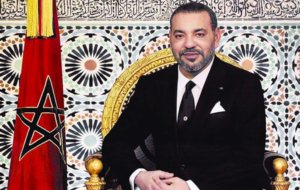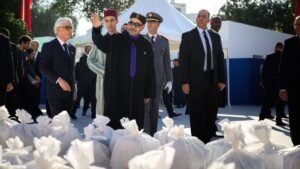Morocco to Produce Its First Aircraft Engine by 2027, Strengthening Its Aerospace Leadership

Rabat, The Gulf Observer: Morocco is advancing toward a historic milestone in its industrial development, with plans to produce its first domestically manufactured aircraft engine by 2027 or 2028, Minister of Industry Ryad Mezzour announced in an interview with Bloomberg on Thursday.
The minister attributed this achievement to the visionary leadership of King Mohammed VI, whose strategic guidance and commitment to stability, education, and innovation have positioned Morocco as a rising global player in advanced manufacturing.
“It’s a vision to prepare young people through skills, training, and strong engineering education, and to invest in renewable energy,” Mezzour said, highlighting the foundations that have made Morocco stand out among its peers.
According to Mezzour, Morocco’s aircraft engine production will reach full operational capacity by 2030, placing the North African kingdom among only five countries in the world capable of producing engines of this technological level.
Describing the achievement as a major industrial breakthrough, he likened it to “reaching the semifinals of the World Cup in manufacturing.”
Earlier this month, King Mohammed VI inaugurated the Safran Aircraft Engine Industrial Complex in Nouaceur, Casablanca, marking a new phase in Morocco’s aerospace development. The complex houses two major facilities, including one dedicated to aircraft engine assembly and testing, and will serve as a cornerstone of Morocco’s expanding aeronautics industry.
The aerospace sector generated over $2.54 billion in export revenues in 2024 and continues to attract major international companies. More than 150 firms, including global leaders, now operate in Morocco, drawn by the country’s competitive incentives — such as zero corporate tax for the first five years, reduced tax rates for the following 20 years, VAT exemptions, duty-free equipment imports, and access to subsidized land and utilities.
Youth Empowerment and Socioeconomic Development
Addressing recent youth-led demonstrations and calls for broader socioeconomic inclusion, Minister Mezzour expressed pride in Morocco’s young population, referring to them as the “pride of the nation” in light of the Atlas Cubs’ historic World Cup success.
“We are celebrating them and very proud of them. Our response is to welcome them into the political space, make it easier for them to join elections and public debates, and provide financial support — up to 75% of campaign expenses — to help them run for office and propose ideas,” he stated.
He also pointed to the upcoming finance bill, which allocates $14 billion for education and healthcare, reflecting the government’s commitment to addressing citizens’ needs while maintaining investment-driven growth.
Expanding Manufacturing and Global Partnerships
Mezzour noted that Morocco’s manufacturing sector employs nearly one million workers, with plans to expand employment opportunities through sustained investment. “We need to add 500 more jobs, and yes, we need more investment. We have a plan, we are executing it, and we have trusted partners investing more and more in Morocco,” he said.
The minister emphasized Morocco’s flexibility in global partnerships, affirming cooperation with reliable partners from China and the United States. “Reliable partners are those who trust Morocco as a global hub and create jobs here,” he added.
Automotive and Electric Vehicle Expansion
Beyond aerospace, Morocco continues to consolidate its position as a regional and global automotive hub. The country currently produces over one million cars annually and aims to increase capacity to 1.45 million, with a long-term goal of two million vehicles per year.
“We are building a full electric vehicle battery value chain, attracting investors to produce batteries for over one million cars,” Mezzour explained, noting that Morocco is already manufacturing electric vehicles and constructing a large battery production facility.
With these initiatives, Morocco is on track to become the only country outside China capable of producing the entire EV battery value chain, from raw materials to finished vehicles. The country aims to boost production by 53% and reach 107,000 electric vehicles by the end of 2025.
Between 2014 and 2018, Morocco’s automotive sector created over 116,000 jobs, and by 2019, that figure rose to more than 220,000, confirming the nation’s status as Africa’s leading automotive manufacturer.
As Morocco prepares to enter a new industrial era, the country’s growing aerospace and automotive sectors, coupled with its skilled workforce and strong international partnerships, are setting the stage for sustainable growth, technological innovation, and economic resilience in the years ahead.


